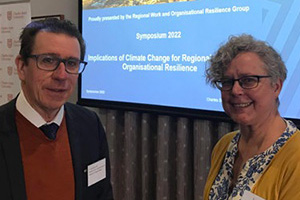Sustainability
- Home
- Locations
- What you can do
- LiFE Framework
- Sustainable Development Goals
- About us
- Grants
- Events
- Contact us
Now searching for:

NSW Member for Wagga Wagga Dr Joe McGirr and Regional Work and Organisational Resilience Group lead Associate Professor Larissa Bamberry at the Climate Change for Regional Work Symposium.
A symposium hosted by Charles Sturt’s Regional Work and Organisational Resilience (RWOR) Group during 2022 shared research exploring the implications of climate change for the physical, mental and emotional health and well-being of regional workers.
Modelling conducted by the group has found that by mid-century, wet-bulb globe temperature will likely cross thresholds that will restrict human physical activity for longer periods of the year across larger areas of Australia. Researchers shared the implications of climate change in the regions for diverse workforce groups including healthcare, mining and defence.
The symposium is one way the RWOR Group has collaborated with regional employers to find solutions for these emerging complications. With the additional impacts of rising temperatures and the changing frequency of droughts and floods, regional employers will need new strategies for managing workers’ well-being and building resilient organisations. In addition, following the symposium, the group has embarked on research to understand and manage the effects of heat on the delivery of the home care services that allow people to age in place.
The symposium took a practical look at how climate is changing and the implications for the regions in relation to human well-being, organisations and communities, physical work and exercise, and heat and stress.
Find out more about
Climate Change Symposium